- Home
- Lauren Gilley
King Among the Dead (Hell Theory Book 1)
King Among the Dead (Hell Theory Book 1) Read online
KING AMONG
THE DEAD
Hell Theory Book One
Lauren Gilley
This is a work of fiction. Names, characters, places, and events are all the products of the author’s imagination, or are used fictitiously. Any resemblances to persons, living or dead, is coincidental, or meant to serve as entertainment, rather than fact.
Names and characters are property of the author and may not be duplicated.
KING AMONG THE DEAD
Copyright © 2020 by Lauren Gilley
Cover design copyright © 2020 by Lauren Gilley
HP Press®
Atlanta, GA
All rights reserved.
“He passes to be King among the dead,
And after healing of his grievous wound
He comes again; but – if he comes no more –
O me, be yon Dark Queens in yon black boat,
Who shriek’d and wail’d, the three whereat we gazed
On that high day, when, clothed with living light,
They stood before his throne in silence, friends
Of Arthur, who should help him at his need?”
From:
“Idylls of the King: The Passing of Arthur,”
Alfred, Lord Tennyson
PROLOGUE
Llandderfel, Gwynedd
Wales
She turned her coat collar up against the rain, shoulders hunched as she walked the last distance to the church. The end of a long journey finally in sight. Streaky light glowed in the windows, and this was her endpoint, at last. Here, she would succeed or fail, and if it was failure that awaited, she had no plans for a future beyond it.
“It’s smaller than I expected,” Lance said beside her, keeping the rain off his face with a raised hand. She heard all the things he wasn’t saying: that they’d come a long way for a wild chance; that if this didn’t work, time would have been wasted. She heard his fear, too, carefully disguised – but not from her. She knew too much of fear to miss the faint, pushed-down note of it in his voice. The others had their doubts, but Lance had been there that night, years ago, when the world had cracked apart underfoot, and he knew what was possible.
She heard the tread of heavy boots behind them, the rest of the team: stern, quiet Tris; easy-going and seemingly-unbothered Gavin; Gallo, young and nervy. Captain Bedlam had stayed behind, her single arched brow bristling with doubt.
She’d let them come, though.
Lightning forked overhead, bright and white as the Rift – but fleeting. Chased by a sharp crack of thunder that rolled, and rolled, and rolled, vibrations felt through the soles of her boots.
Gallo swore softly.
A few paces from the door of the church, it swung open, and emitted a hunched, robed figure that lifted a hand in greeting. When she’d called, earlier, she’d been surprised and pleased to have her questions passed along to a brother who spoke soft, lilting French; the local Welsh accent had been impossible for her to understand. Brother Eustace, he’d said his name was, and that was who was coming toward them now, if the French greeting – shouted to be heard over the weather – was anything to go by.
Rose stepped forward and took his hand, met by small, but bright, keen eyes set in a homey, weathered face. “Brother Eustace?” she asked in French.
“And you must be Rose. Come in, come in, out of the rain.”
He led them into a cozy, dimly-lit chapel, its pews gleaming, dark wood, its altar blazing with candles. Through it, and to a door that led down a flight of stairs, belowground, and into a stone kitchen with a roaring fire and long, plank table.
Another brother was there, laying out bread, and cheese, grapes, steaming cups of tea.
“Sit, please,” Eustace encouraged. “Eat. You must be cold, and the tea is strong.”
They settled at the table. Gallo reached immediately for food, which caused Tris’s mouth to tighten in silent reprobation.
Gavin cast a glance around the room and said, “How many rooms do they have down here, you think? It’s a lot bigger than I thought.”
Rose accepted a mug of tea, to warm her hands, but didn’t drink. She hadn’t had tea since Beck last served it to her, hot and too sweet and perfect. Keenly aware of Lance beside her, his elbow pressed to hers, she turned to Brother Eustace and said, “I want to be blunt, Brother.”
He smiled, not unkindly. “You rather were over the phone, dear. I admit I was surprised: we don’t get too many visitors anymore, much less requests such as yours.”
“Is it possible?”
“Oh, quite. But you should understand that it’s no small thing, fetching a soul.”
Lance cleared his throat. “Even if it works, and his soul comes back…will he be…useful?”
Rose stiffened; bit her lip hard to keep from lashing out. His elbow pressed in hard, and then pulled back, a silent apology. To Brother Eustace, she said, “Will he be alive?”
His brows lifted. “Oh, yes. Very much so. He will have a body.”
She nodded, relieved.
“Though, in my experience…raised souls are a bit…changed.”
“Changed how?”
“Stronger, often. Touched by their time in the pit. He will have been through…great trials. Impossible pain.”
She nodded again. She’d tried not to imagine, over the years, but the nightmares had crept in anyway. Visions of flames, and of torture; of madness; of the dark, Biblical horrors from old Victorian illustrations.
“We can prepare the ritual,” Brother Eustace said. He laid his hand beside hers on the table, but didn’t touch her; respectful, or frightened, she wondered. “The Saint of our Order can journey into places no mortal ever could, and return this damned soul to you. But I will ask you this, before we begin: Are you sure? It’s no small thing snatching a soul from Hell, my dear. When you go before Saint Derfel, and ask this of him, can you tell me that you’ve weighed this decision carefully?”
“Yes,” she said in English. In French: “This is the only thing I can do. The only.”
He nodded. Stood. “Very well.” Over his shoulder, to his fellow monk: “Go down and begin preparations. Tonight a saint walks, and a soul rises.”
Outside, thunder rumbled.
Hold on, my darling, Rose thought. I’m coming.
ONE
Before
The first time Rose met Beck, she was locked inside the pie safe. It was a tall piece of furniture, with wire-enclosed racks up top for the cooling of the pies Miss Tabitha never baked, and with a lower cabinet just big enough for a coltish eighteen-year-old to fit inside with her knees drawn up. Miss Tabitha had slid a lock through the handles after Rose crawled into the dark, clicking it shut with an instruction to think about what she’d done.
In the pitch blackness, stomach growling, hands folded up at the bend of her waist, Rose scolded herself for leaving the wash out on the line, her latest pie-safe-worthy transgression. One in a long line over the past four years. Had the world been a different sort of place, she might have complained, but the world was what it was, already dim and fuzzed at the edges with ash, already harsher, bleaker, more dangerous. No one cared that Miss Tabitha had forged the paperwork to say that Rose was only sixteen, and still able to earn a foster parent government funds. No one cared that she was locked here in the total dark.
Rose waited, breathing shallowly, and listened to Miss Tabitha light one of the cigarillos she smoked and pour herself a glass of vodka. Listened to that familiar heavy body strain the seat of a dining room chair; the drone of the fan in the corner, and the murmur of the TV when it clicked on: Miss Tabitha’s favorite evening “stories.” She tried not to think ab
out the fact that she couldn’t turn up at work like this; that Mr. Fisher would finally fire her over this failure to show.
Then: unexpected sounds.
Miss Tabitha said, “Hey! What the hell? Who are you? You can’t…” And then there was a muffling, a garbled scream, a thump. A wet sound, like rain spattering against a window.
Footfalls: light, precise.
A clink, a rattle; sound of the lock on the pie safe falling, and then the cabinet doors swung open, the dim lamplight washed over her, and she saw a man, crouched there in front of her.
Her first instinct was to scream. Miss Tabitha invited men over sometimes, men who…
But this man didn’t look like any of them. No, he looked far different.
His eyes caught her first, and held her attention, a warm honey color, green-brown like river water. His hair, silk-soft and wheaten, fell to his shoulders, artful across his brow, behind his ears. He had a face of sharp angles: cheeks, jaw, chin.
“Hello, little one,” he said, and his voice was velvet, was silk, was sinuous and slippery and good. He tipped his head to the side, which sent his hair sliding over his shoulder with a soft rustle. “What are you doing in here?”
Strangers always meant danger in this city, and fine tremors had hold of her. But Rose swallowed, and managed to say, “Miss Tabitha…”
“Ah. She won’t be locking anyone else in a cabinet, I don’t think.”
Rose shifted as much as she dared, skin prickling with goosebumps, and peeked over his shoulder. He even shifted, obliging her, and she saw Miss Tabitha at her kitchen table: slumped forward, eyes open, unseeing. Red on the table, all down her front; a puddle in her lap, dripping down onto the floor. Blood. Rose could smell it.
“Tabby and I go way back,” the man said. “I can’t say we were ever friends.” He held out a hand, palm-up, in offering. It was speckled with blood. When Rose looked closer, she saw that he wore a stippling of red on his face, across the bridge of his nose. “Would you like to get out of here, darling?”
Rose swallowed. Considered. Placed her hand in his. “I’m Rose.”
“Simon Becket,” he said, and drew her forward, and up, out of the cabinet. When her knees threatened to give out, he steadied her with a hand at each of her elbows.
He was very tall, she noticed. Very lean. He smelled like dusty old books.
“Can you walk?” he asked.
“Yes.” And she did. Across the room, past the corpse of her foster mother. Up the stairs, and out into the street, behind Simon Becket, and out of her old life forever.
TWO
His friends used to call him Beck, he told her, though he didn’t really have any of those left, but she was welcome to use the nickname. His house, when they reached it, loomed tall and sinister up out of the shadows, a dark-painted, three-story Gothic townhouse in a line of others not quite like it. He had a tall iron gate that he opened with a key – one on a ring full of many, another of which he used to unlock the front door.
A long hall with rooms opening off on both sides. Rose had the impression of dark wood paneling, and furniture with curved legs; rows of bookshelves and, when lightning flashed outside, mounted animal heads on the walls. Things with horns and tusks and black glass eyes.
Only a few lamps burned, and those dim, energy-conserving. He flipped a few more on when they reached the kitchen: a low, timbered-ceilinged space with brick floors, wood cabinets, and a fireplace at one end. Everything had the air of being old, almost shabby, but well-loved; nothing broken or falling-down.
Beck made tea: a quiet, comfortable sort of bustling about. And it was only when he slid a chipped blue mug across the island to her that she realized she was standing mute in the center of the room, fingers knotted together, wondering if she ought to be frightened, or give in to the greater, stranger urge to feel comforted by these circumstances, and the company in which she’d found herself – quite suddenly and impossibly.
She stepped forward, and took the cup in both hands, savoring the warmth that seeped through the porcelain. “Thank you.” She didn’t just mean about the tea.
Beck dipped his head in a deep nod, and she thought he understood. “So. Rose.” He poured himself a cup and added several spoonfuls of sugar from the bowl. “How long were you with Tabby?”
The tea was earthy, and almost too sweet, and wonderful. “Four years.”
“And how many years has it been since you aged out of the system?” When her brows went up, he said, “I have a sense for these things.”
“A year.”
He nodded. “Well, then. You’re a free woman. Free to go wherever you want, and do whatever you’d like.”
She’d never considered such a thing. It terrified her, honestly.
Warmth touched her hand, and she realized she was trembling so badly that she’d slopped tea out of her mug. She set it down with a harsh breath.
“That’s a lot to realize all at once,” he said, voice still low, silky, soothing. “You don’t have to make any decisions yet. I have spare rooms.”
“Oh.” Her pulse gave a hard little bump. “Oh, well, I don’t want to bother you.”
He met her gaze, and again his arrested her. Deep-set eyes, clear, and so very alive. They fairly sparked, though his posture spoke of calm rationale. “It’s no bother. I have the room. And company is nice.” He paused. “The right sort of company.”
Rose thought of Miss Tabitha’s blood. Its path across the table, and down the front of the rumpled old dress. It still freckled Beck’s nose and cheeks; small, dark dots like true freckles in the low light.
Thought of the still-healing welts on her own back. Of the bruised fingers. Of the hours spent in that pie safe – overnight, once, hours and hours, until she’d grown so frightened she beat against the walls of it and a staggering, sour-breathed Miss Tabitha finally unlocked it.
She took a steadying breath and reached for her tea again. “I think so, too.”
He smiled, then, flashing canines sharp as fangs. “It’s nice that we agree.”
~*~
When her stomach rumbled, he pulled the makings of sandwiches from the fridge: thin, marbled ham, and swiss cheese, and thick, salty pickle wedges, all on seed-topped bread that he said he’d made himself. Rose offered to help, but he waved her off, and she was trembling with leftover nerves. She climbed onto a stool at the counter and watched him work; his long, golden fingers moving deftly as he assembled sandwiches, slicing them both on the bias with a flourish that twirled the knife in his hand.
A clean, bright knife, winking in the lamplight.
“What did you use?” she asked, when curiosity proved too strong.
He slid a plate in front of her with tawny brows lifted in question. Thunder rumbled outside, the low, faraway kind that had become nearly constant. The occasional flash lit up the mullioned windows.
“On Miss Tabitha,” she clarified. She didn’t want to say when you killed her.
He nodded, though, understanding. “A knife.” He lifted one arm, and flexed it, and the blade slid out from a holster hidden inside his sleeve. A long, slender, clean-edged thing with a carved handle that made her think, oddly, of him. His honey-brown hair and his sharp, clean lines. The blade was already clean, gleaming before he retracted it. “You have to take proper care of your tools,” he said, and picked up his sandwich.
She picked hers up, too. The first bite was all salt-sharp-vinegar, delicious. All she’d had for three days was a bite of stale bread and milk, and she knew she couldn’t eat this delicately, elegantly. Knew she would shame herself in front of his strange and delicate, elegant man.
But he smiled at her as she ate, eyes crinkling at the corners. “Eat up,” he said, between his own bites. “There’s plenty more.”
~*~
When her belly was full, and the tea was gone, she helped Beck with the dishes. He washed and she dried; white and blue china printed with flowers, and horses, and carriages. They went in the rack, and the
n he turned out the lights, ignited a small oil lamp, and lead her back down the hall and up the stairs.
The light flickered and swelled as they ascended, up two switchback landings, and she glimpsed the gilt frames of old oil portraits: men and women with stern expressions, severe clothes, and hands folded in their laps. She didn’t have time to stop and study them, but she recognized Beck’s cheekbones in several, those honey-colored eyes; a mysterious set to the lips that was neither smirk nor smile.
He led her down a long, carpeted hall, and through a heavy, solid wood door, into a room that smelled cool and dusty – but, like the rest of the house, not unclean. Nothing like Miss Tabitha’s, with its mold and boiled cabbage.
She lingered in the doorway, though, until he’d clicked on the bedside lamp. Revealed a curtained window, and a four-poster bed with a blue velvet coverlet. An ornate dressing table with a flaking mirror. All of it old and lovely.
Beck held the lamp high in one hand and pulled back the coverlet with the other; fluffed the pillows; picked a spot of lint off the white sheets. Stepped back and surveyed the room.
“I’m sorry it isn’t fresher, but I think it’ll have to do for tonight.”
“It’s fine. It’s better than fine,” she rushed to say. She didn’t want to offend.
He went to nudge open an adjoining door. “This bathroom is an en-suite. All for you. There’s soap and such under the counter.” He leaned in with his head and arm, scanning it, voice echoing off tile and porcelain. “I’m afraid the towels are a little musty, but no one else has used them. We can wash them fresh in the morning.” He pulled back, and walked toward her, surveying the room once more. It gave Rose a chance to study him, briefly, as he approached.
He wore thick-soled boots that laced halfway up his calves, his pants black and clinging, accentuating the length of his legs, the graceful way that he walked. He’d taken off his jacket, a black leather thing that flared around a waist that she could now see was sharply narrow, clothed only in clinging black cotton. She’d admired his bare arms, before, when they were washing dishes at the sink, when the suds had dripped down the veins and knobs of his wrists.

 Mystic Wonderful : A Hell Theory Novella
Mystic Wonderful : A Hell Theory Novella King Among the Dead (Hell Theory Book 1)
King Among the Dead (Hell Theory Book 1) Golden Eagle (Sons of Rome Book 4)
Golden Eagle (Sons of Rome Book 4) Night In A Waste Land (Hell Theory Book 2)
Night In A Waste Land (Hell Theory Book 2)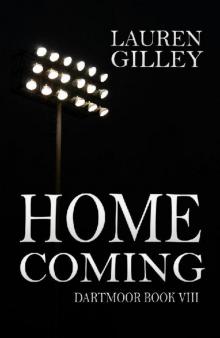 Homecoming (Dartmoor Book 8)
Homecoming (Dartmoor Book 8)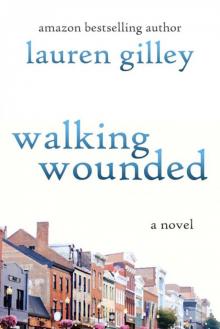 Walking Wounded
Walking Wounded Heart of Winter (The Drake Chronicles Book 1)
Heart of Winter (The Drake Chronicles Book 1) Prodigal Son (Lean Dogs Legacy Book 3)
Prodigal Son (Lean Dogs Legacy Book 3)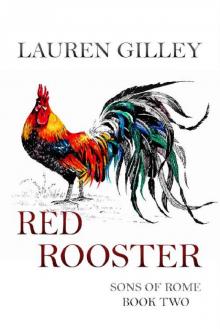 Red Rooster (Sons of Rome Book 2)
Red Rooster (Sons of Rome Book 2)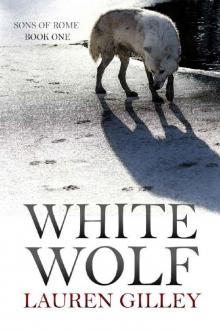 White Wolf
White Wolf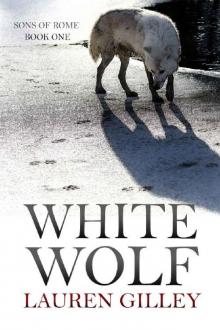 White Wolf (Sons of Rome Book 1)
White Wolf (Sons of Rome Book 1) Tastes Like Candy (Lean Dogs Legacy Book 2)
Tastes Like Candy (Lean Dogs Legacy Book 2) Dragon Slayer (Sons of Rome Book 3)
Dragon Slayer (Sons of Rome Book 3) American Hellhound
American Hellhound Lone Star (Dartmoor Book 7)
Lone Star (Dartmoor Book 7)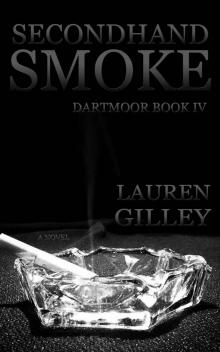 Secondhand Smoke (Dartmoor Book 4)
Secondhand Smoke (Dartmoor Book 4) Loverboy (Dartmoor Book 5)
Loverboy (Dartmoor Book 5) The Stalker
The Stalker Price of Angels (Dartmoor Book 2)
Price of Angels (Dartmoor Book 2) Made for Breaking
Made for Breaking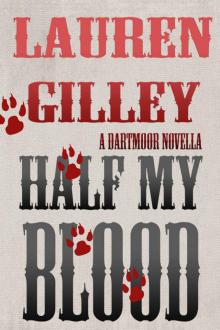 Half My Blood
Half My Blood Snow in Texas (Lean Dogs Legacy #1)
Snow in Texas (Lean Dogs Legacy #1) Made for Breaking (The Russells Book 1)
Made for Breaking (The Russells Book 1) Fearless
Fearless